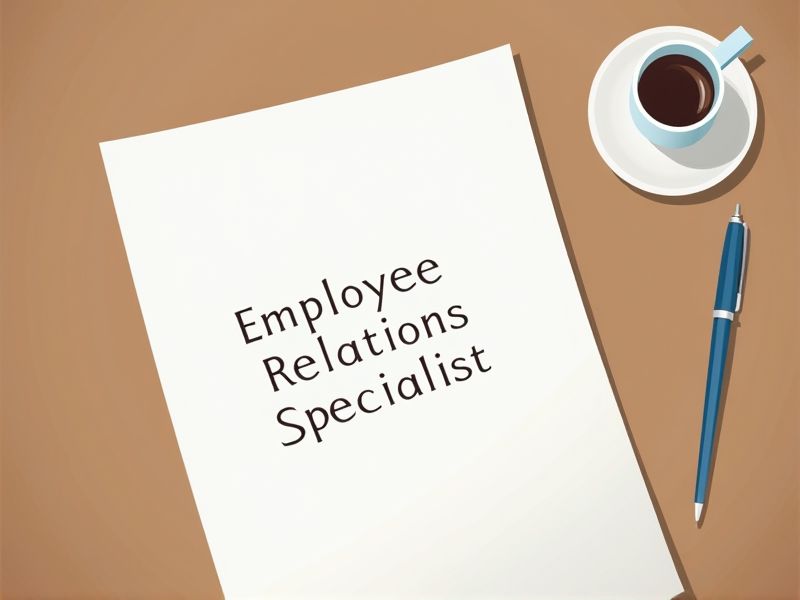
The role of an Employee Relations Specialist hinges on effective communication, conflict resolution, and understanding labor laws. Certifications validate a specialist's knowledge and expertise in these areas, ensuring they can adeptly handle workplace issues. Possessing specific certifications also enhances credibility and can make an individual more competitive in the job market. Here are some important certifications you may need for Employee Relations Specialist.
SHRM Certified Professional (SHRM-CP)
Achieving the SHRM Certified Professional (SHRM-CP) credential equips an Employee Relations Specialist with a recognized standard of HR knowledge, bolstering their credibility in the field. This certification enhances the specialist's capability to effectively navigate complex employee relations scenarios, given its focus on contemporary HR practices and employment laws. Employers often prefer or require SHRM-CP certification for such roles, acknowledging the comprehensive skill set it represents. The certification process encourages the development of strategic thinking, crucial for implementing policies that align with organizational goals.
SHRM Senior Certified Professional (SHRM-SCP)
Possessing the SHRM-SCP credential often enhances an Employee Relations Specialist's credibility because it signifies advanced HR knowledge and strategic competencies. This certification can lead to better conflict resolution skills as it involves in-depth training on interpersonal and organizational dynamics. Employers may recognize the SHRM-SCP as a mark of commitment to professional development, potentially leading to career advancement opportunities. Many organizations prioritize hiring individuals with top-tier certifications, aiming to ensure effective employee management and alignment with company goals.
Professional in Human Resources (PHR)
A Professional in Human Resources (PHR) certification signals comprehensive understanding of HR laws and regulations, crucial for navigating complex employee relations. Holding a PHR ensures the specialist is adept in conflict resolution, fostering a harmonious workplace. This certification provides a structured framework for handling sensitive employee issues while maintaining compliance. Organizations benefit from PHR-certified specialists as they contribute to improved employee satisfaction and reduced turnover.
Senior Professional in Human Resources (SPHR)
The Senior Professional in Human Resources (SPHR) designation signifies a deep understanding of strategic HR management, which enhances an Employee Relations Specialist's ability to align employee practices with organizational goals. It equips specialists with advanced skills in policy development and implementation, crucial for managing complex employee relations issues. The SPHR certification ensures the specialist is knowledgeable about the legal and ethical considerations necessary to mitigate workplace conflict and resolve disputes effectively. This level of expertise fosters a more cohesive work environment where employee relations are handled proactively and constructively.
Certified Employee Benefit Specialist (CEBS)
Obtaining a Certified Employee Benefit Specialist (CEBS) designation equips an Employee Relations Specialist with in-depth knowledge of benefits programs, leading to more informed negotiations with employees. With CEBS expertise, specialists can ensure compliance with legal and regulatory requirements, reducing potential legal issues. This certification enhances an organization's ability to design competitive benefits packages, improving talent retention. Specialists armed with CEBS credentials contribute to employee satisfaction, fostering a more engaged and productive workforce.
Certified Professional in Learning and Performance (CPLP)
Organizations increasingly demand strategic development skills, leading to a greater necessity for certifications like CPLP in employee relations roles. The CPLP certification equips specialists with proficiency in talent management and training, enhancing workplace productivity. Employees under certified specialists often experience improved communication and engagement, aligning individual and organizational goals. The empirical evidence suggests that certified professionals foster a more cohesive work environment, reducing turnover rates.
Certified Compensation Professional (CCP)
A Certified Compensation Professional (CCP) provides expertise in designing competitive and equitable compensation programs, critical for ensuring employee satisfaction and retention. Having a CCP can lead to more informed decision-making regarding salary structures, which directly impacts employee morale and reduces turnover. Understanding market trends and benchmarking allows CCPs to advise on compensation policies that align with company goals while addressing employee concerns. With detailed knowledge on compliance, a CCP helps navigate legal complexities, minimizing the risk of disputes and enhancing overall employee relations.
Certificate in Employment Law
A Certificate in Employment Law equips an Employee Relations Specialist with a comprehensive understanding of legal standards, thus improving their ability to handle workplace disputes effectively. Knowledge of employment law ensures compliance with regulations, reducing the risk of costly lawsuits for the organization. Enhanced legal insight aids in crafting fair company policies that protect both employer and employee rights. This certification also bolsters credible leadership, fostering a trustworthy environment for open employee communication.
Certificate in Labor Relations
A Certificate in Labor Relations equips an Employee Relations Specialist with the necessary knowledge of labor laws and union negotiations, directly impacting their ability to handle workplace disputes effectively. Understanding collective bargaining agreements helps specialists ensure that company policies align with legal standards, reducing the risk of legal challenges. Familiarity with labor relations enhances communication skills, crucial for mediating conflicts between employees and management. Continuous learning through certification fosters a deeper understanding of employee rights, aiding in creating fair workplace policies.
Diversity and Inclusion Certification
Organizations with certified Employee Relations Specialists often experience improved conflict resolution as diverse perspectives contribute to finding equitable solutions. Certification in diversity and inclusion equips specialists with tools to foster a more inclusive workplace, leading to higher employee satisfaction and retention. Without proper training, unconscious biases might adversely affect decision-making processes, potentially causing employee grievances and affecting morale. Understanding and implementing diversity and inclusion strategies can enhance team dynamics, driving innovation and productivity across the organization.
Summary
When you obtain certifications as an Employee Relations Specialist, you enhance your credibility and expertise in managing workplace dynamics. Your ability to handle sensitive issues and mediate conflicts becomes more refined, leading to improved resolutions. Organizations recognize your qualifications, increasing your desirability and potential for career advancement. As your skills contribute to a healthier work environment, overall employee satisfaction may increase.
